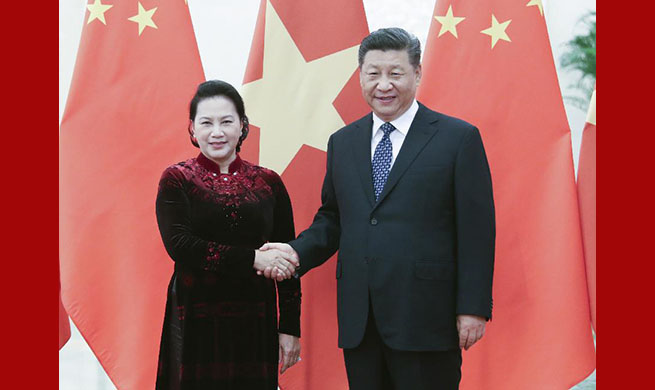BERLIN, July 12 (Xinhua) -- Carbon dioxide (CO2) emissions from buildings and transport should be included in the European Union's Emissions Trading Scheme (EU ETS) by 2030, according to a recommendation from the German Council of Economic Experts presented to the government on Friday.
Until then, Germany should seek to introduce a separate emission-trading system or a CO2 tax, the German government's advisors stated.
A separate emissions trading system beyond the EU ETS sector would be "easier to communicate and later easier to transfer to integrated emissions trading". However, the government advisors said the "implementation will take some time".
In the short term, a carbon tax would be a quick way for Germany to reach its climate targets in 2030 but the tax should be adjusted regularly and the revenues used solely for climate protection, according to the experts.
German Chancellor Angela Merkel said that her government felt "encouraged" by the experts' report to pursue market-based measures in reducing Germany's carbon dioxide emissions.
"The current debate offers the historic opportunity to change Germany's small-scale, expensive and inefficient climate policy in such a way that the pricing of CO2 is at the center of attention," said Christoph Schmidt, chairman of the German Council of Economic Experts.
At the same time, such national solutions "only make sense on a transitional basis", according to the German economic experts.
However, Merkel noted that "the issue of CO2 pricing is certainly very complex" and there would "still be broad discussions about this".
Germany is currently failing to meet its own and international climate protection targets. In mid-September, the German government is planning to decide on a package of measures to help it meet its target for 2030 of reducing greenhouse gas emissions by 55 percent compared to 1990 levels.
Researchers from the Mercator Research Institute on Global Commons and Climate Change (MCC) and the Potsdam Institute for Climate Impact Research (PIK), which contributed to the report, said that a carbon tax option stood a "higher chance of swift implementation from an administrative perspective" compared to creating a separate emissions trading scheme.
"The introduction of a CO2 tax is easier to implement, ensures transparency and can lead to an adequate incentive effect by increasing the tax rate," said Claudia Kemfert, head of the department of energy, transportation and environment at the German Institute for Economic Research (DIW).
In contrast, the Association of German Chambers of Commerce and Industry (DIHK) warned against placing additional burdens on German companies through new rules and stressed that climate protection is most effective in a global consensus.
"The concept that is ultimately selected must therefore at least be compatible with European regulations in order to avoid competitive disadvantages for the German economy," DIHK President Eric Schweitzer told the German newspaper Rheinische Post.













